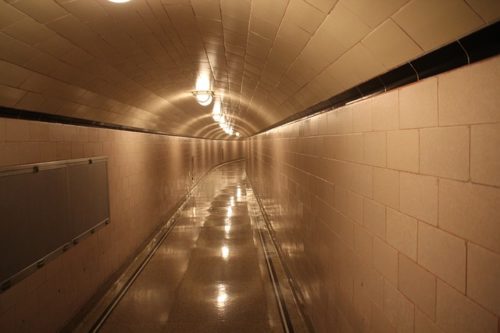![]()
Almost a year ago, I organized and led a panel at Paganicon called “Pagan Clergy: How to Welcome Sex Offenders and Ex-Felons into Our Communities.” The overall convention theme was Through the Looking Glass: a Journey to the Underworld, so shedding light on marginalized communities within the larger Pagan community seemed appropriate. We do not always see what is beneath in the underworld until we begin looking.
As a religious group leader and prison minister, I wanted to see how the larger community would respond to the most frequent question posed by the incarcerated: where can I go to ritual, or where can I find a group once I get out? The panel was a rudimentary attempt to bring together in an unofficial capacity representatives from the Minnesota Sex Offender Program (MSOP), clergy who serve in prison ministry, and the larger community at Paganicon for a long-overdue discussion on what the reception of formerly incarcerated would be in our community.
Background
In Minnesota, the urgency for this type of discussion arose from a series of lawsuits challenging the legitimacy of the MSOP program due to the limited number of individuals released from the program during its roughly 20-year history. The program is a civil commitment program, but the view from the outside is the same as if these individuals were serving time in a state or federal prison: these are offenders who are treated as “other.” At a time when the faiths and traditions that fall under umbrella term “Paganism” are gaining new members, one question remains for those who have been incarcerated in some form: where will they go?

[Pixabay.]
Facilities are always looking for spiritual volunteers because the need is so great. When I was completing third-degree work, one of the questions that I faced would be how I would serve as clergy, should I undertake that training upon completion of my third degree training. In the Pagan community, that service can take many forms including leading groups, working with the homeless or other community initiatives, organizing and contributing to Pagan gatherings, or working towards a common goal set within the community or group.
In my home tradition, prison ministry has always been seen as an option to serve the many who are isolated and disenfranchised. In the criminal or civil commitment system, the ability to practice with others is limited by the rules of the facility. This includes requiring a minimum number of participants before a group can secure meeting times, group ritual space, and religious festival considerations. The religion also has to be recognized as such by the administration. This structure limits the number of organized groups which means potential participants must choose between solitary practice or grouping with others provide larger community comfort, but not necessarily tradition-specific comfort.
Present
Now, as a Pagan religious group leader and minister, I see the irony within the system with each visit I make. Those who are newly adopting a path, such as Wicca or Asatru, learn the basics from others and the few spiritual volunteers that prisons can find. Because the books, ritual items, ritual space, and time are in limited supply, they are precious and desired. The hunger and craving for more on the part of the incarcerated reveals itself in a type of strong devotion that is often admired on the outside in the larger Pagan community. These are the individuals who devour each lesson and want several more with each visit.
Outdoor rituals are held sometimes in the rain, in the mud, and in the cold with the wind howling from the north because the alternative is an acknowledgement of the restrictive nature of incarceration. These are devoted individuals whose past acts make them suspect in the larger community, yet their faith and acts of devotion challenge the very ideal of what our groups believe. Do we take everyone, or are there limitations regardless of any rehabilitation that is done in a secured facility? This is not an easy topic or question to face. It is a matter of freedom.
While we gather at festivals and public rituals, where we are able to freely do workings as we will, these are the individuals who have to make do with what is permitted by a system that often does not understand, and in some cases, one that often forbids the basic tools of our respective faiths. They are not free to pray openly in a manner that those in the community on the outside are able to do, all other things being equal. I am not speaking of those who live in communities where terms such as Witch, Heathen, Hellenist, Druid, Voudon, Santeria, Wiccan and the like are viewed with suspicion. That is another type of incarceration, and worthy of its own separate discussion.
For those who are confined by commitment, be it civil or criminal incarceration, the ability to worship is determined by a group of individuals who often do not understand the very religious faiths they are restricting. Do you need an athame or ritual knife? Try a feather or some other acceptable representative tool that has been approved by committee or the individual prison facility.
Do you want to have your own tarot deck and keep it in a traditional manner by wrapping it in its own cloth? You can have the cloth as an altar cloth, and you have the cards, but the cards in a bag or cloth may be restricted. Does your tradition require certain handmade items, such as your own book of shadows or other record of magical workings? You can have the book, but you might have to use items purchased from the commissary that are man-made with no metal, or items that are home-made, but that cannot use ties. Your items may be searched and your journal may be read even though this may be against the rules at your facility. Your journal and books may be one of the rare paths to freedom.

[Pixabay.]
If you think that this does not affect you as a Pagan, whether you are a Witch, Heathen, polytheist, or in any way classify yourself as “Pagan,” then think again. We condemn a lack of freedom. We fight for religious freedom for all.
During this season of a sabbat, such as Imbolc, and for our loved ones in the Southern Hemisphere, Lughnasadh, we celebrate with fire. Fire transforms, and it is the symbol of change. What burns is changed forever. We choose to write our goals or what we are leaving behind on paper to toss into the fire for confirmation of our intent. When religious freedom is denied for some, we all suffer.
One reality that occurred as the result of moderating this panel in 2017 was that I got to see how my community would consider handling those who might be released from incarceration, be it civil or criminal commitment. Members of some groups admitted that in their charters, they do not allow those who have committed serious offenses, such as murder and rape, to join or to initiate; others went on a case-by-case basis. Other groups view sex offenders under a different category with no chance to join if the group has large numbers of families with minor children. This means that the reality for the committed, be it civil or criminal, is the same as what is presently at hand. The only difference is that the commitment and confinement is from the outer community.
In Minnesota, as the court case is back in the news as another challenge may release a sex offender. While the case winds its way through appeals, new challenges, and even more cases, there are men who are on the precipice of release. They have no illusions about how they will be welcomed by those who are not in the Pagan community. The release procedure involves acceptance in a halfway house or some other acceptable option that may be of a non-Pagan religious nature.
If the facility is known to be heavily Christian, there is a possibility of having to hide or not mention any religious belief that might jeopardize these last final steps to freedom. In a recent conversation with several men who were looking at the court path of one to two years, they were open in naming which places were anti-Pagan where they would have to be careful if they were accepted for placement. Some admitted that they would need to start their own groups once they got out because the message they had from others was clear: we may not have room for you.
Future and Challenge
In looking back at the state of the union for this small part of our community, I raise the question and continue the challenge: where can the formerly incarcerated and committed go? Will we welcome them, will we turn them away, or will we remain silent?
Let’s face it: if a group does not want to deal with or to accept those who have a prison record or sex offenders who have completed treatment, then that should be clearly stated up front so that there are no questions from anyone. If you have a group or are in a group, this may be a good time to discuss where your group stands on this issue. When, how, and why should groups consider whether or not to admit the formerly incarcerated? Is it in your charter or papers that defines the group’s religious beliefs and requirements for attendance, membership, and initiation? If not, ask, “Why not?”
If your group does welcome those who have been in prison, but only for certain types of crimes, then clarify that for the group and for those who are coming in. Does your group consider each inquiry on a case-by-case basis? If so, make that clear as well. Put your stand in writing so that there is no confusion when an inquiry or request comes up.
This is not to say that each group needs to welcome everyone. Rather, one problem with those who are coming out of incarceration of any type is finding a place where people are open and honest about what will and will not be accepted. The person reaching out may have as much, if not more, religious devotion than any potential student or neophyte who is not serving a sentence for criminal or civil offenses. The worst feeling is knowing that there is a person with devotion and potential who will not fit, and not knowing how to make that clear up front. If those coming out know that they will need to be solitary or form only groups with the formerly incarcerated, then that is more honest than the dance that is currently done.
This is a difficult conversation to have, as it may uncover hidden biases that are not in keeping with the public image of Paganism as being the home of a traditions that welcome and accept all. As Pagans, we do not like to think of ourselves as holding up a stop sign, as many come to get away from more restrictive religions and, in some cases, painful childhood or adolescent experiences with religion.
If we are to be the place where anyone can find religious and spiritual renewal and peace, then the right thing to do is to state boundaries clearly and in writing. In the end, if one of our goals as a larger community is to admit all and to be open to all, then the state of our union is either stronger or weaker from the admission of the formerly incarcerated and sex offenders. The final outcome remains to be determined by how individual groups choose to state their honest preference.
If anyone else has a solution, please speak up. We certainly could use that now. As a community, we are running out of time to find one.

[Pixabay.]
* * *
The views and opinions expressed by our diverse panel of columnists and guest writers represent the many diverging perspectives held within the global Pagan, Heathen and polytheist communities, but do not necessarily reflect the views of The Wild Hunt Inc. or its management.
The Wild Hunt is not responsible for links to external content.
To join a conversation on this post:
Visit our The Wild Hunt subreddit! Point your favorite browser to https://www.reddit.com/r/The_Wild_Hunt_News/, then click “JOIN”. Make sure to click the bell, too, to be notified of new articles posted to our subreddit.